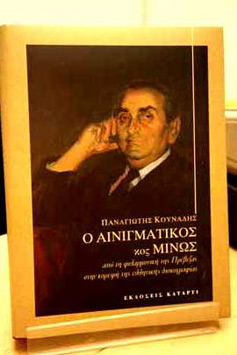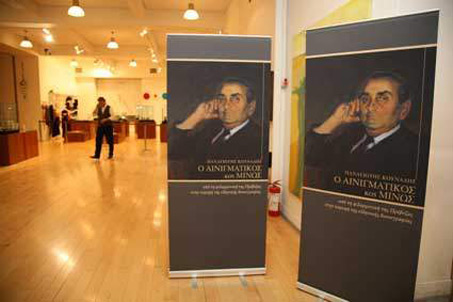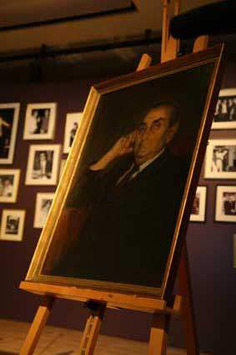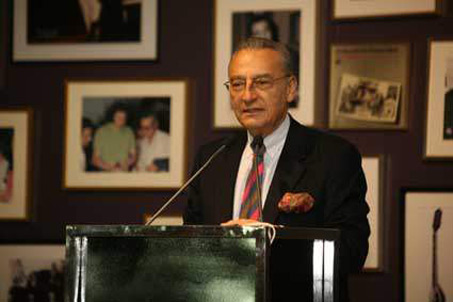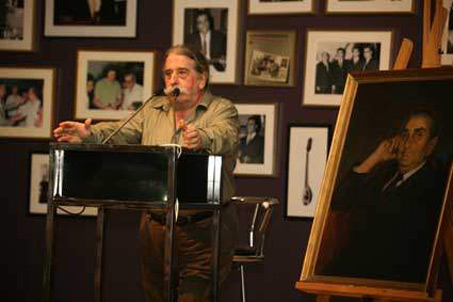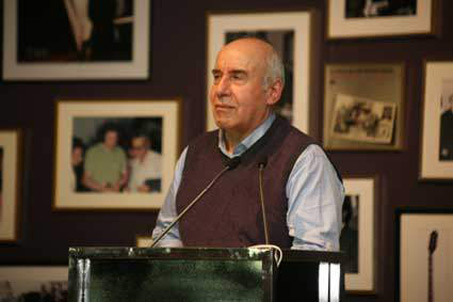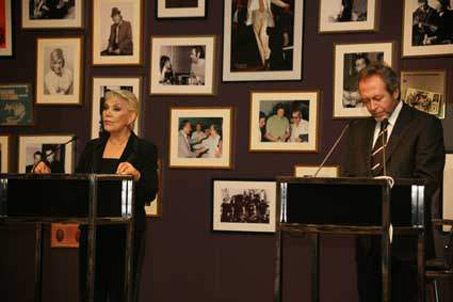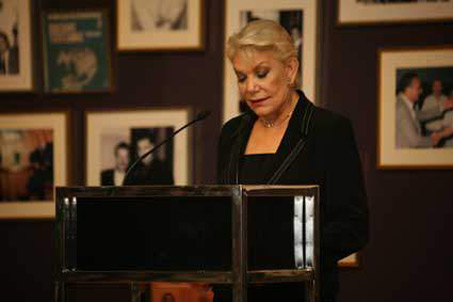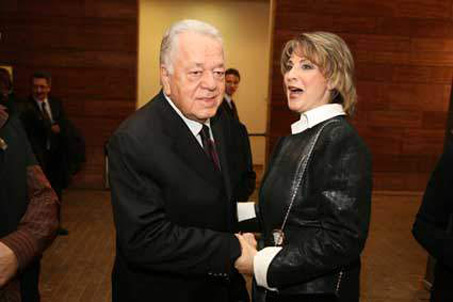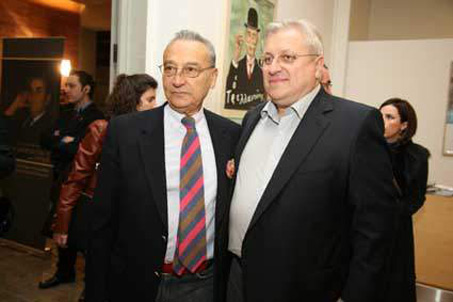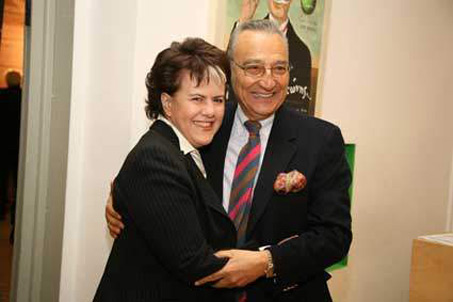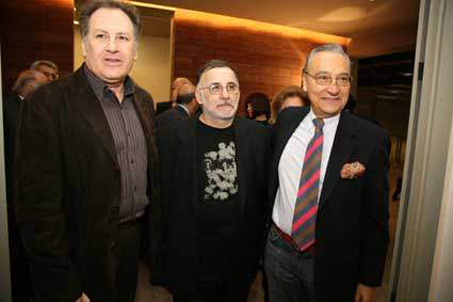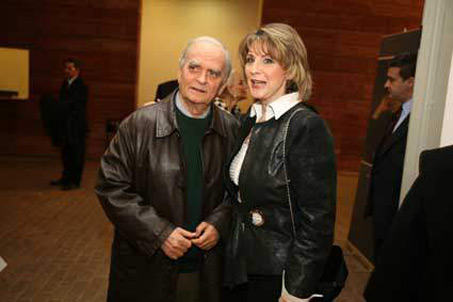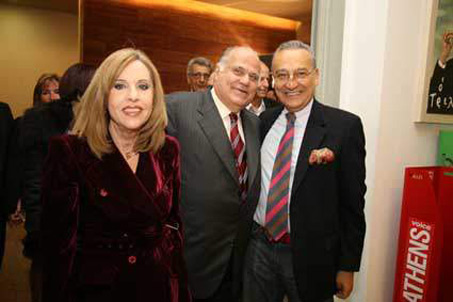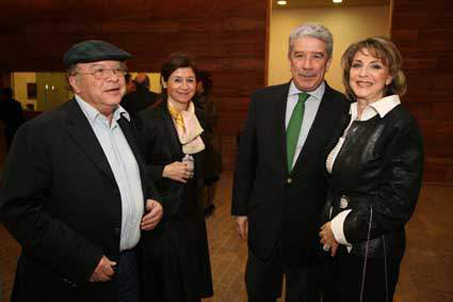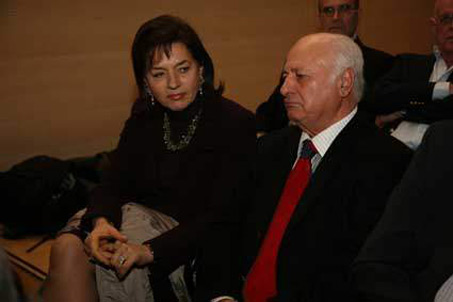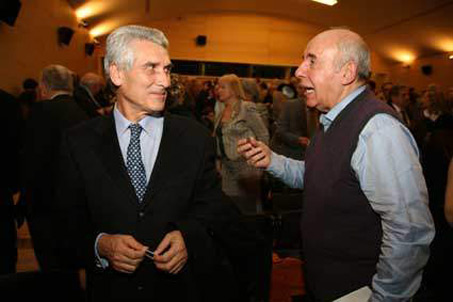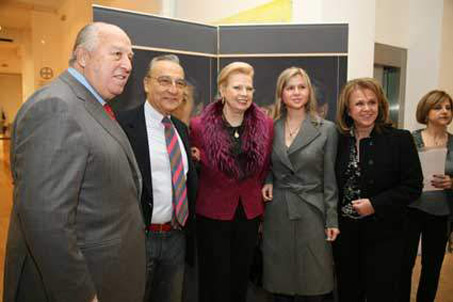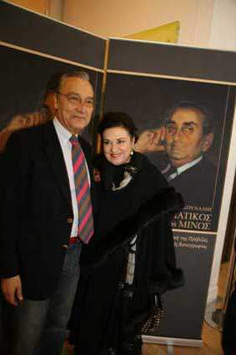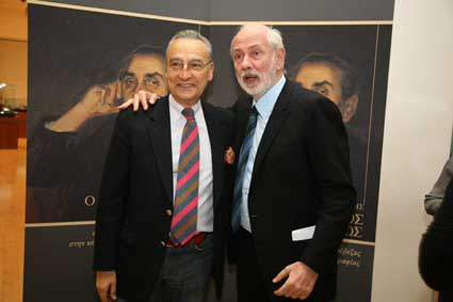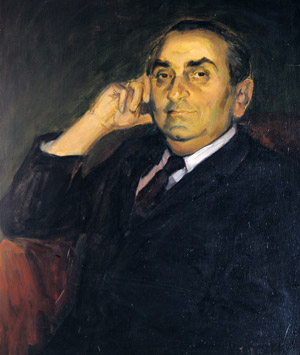

Minos Matsas senior
Minos Matsas saw the light of day in Preveza in 1903. He was the fourth and last child of Samuel Matsas and Stamoula, a family of Roman Jews who are said to have settled in Preveza, at least since the beginning of the 18th century.
He finished his high school studies between Ioannina and Preveza in 1921. From a very young age he said that he wanted to become a doctor. So in 1922 he enrolled at the Medical School of the University of Athens. However, it took him a while to find out that he could not stand the anatomy course and so he transferred to Law School, while at the same time he started working at the Agricultural Bank to cover his daily expenses.
In 1926 he enlisted and served until 1928 in the military band due to his musical knowledge that he had acquired as a student at the Preveza Philharmonic (he played the clarinet).
In 1927 he starts writing lyrics. His first songs are set to music by the best artist of that time like Nikos Hatziapostolou and Panagiotis Tountas and are recorded before he even has any professional involvement in discography.
In 1930 the pioneers in discography in Greece "Abravanel and Benveniste" from Thessaloniki came to Athens to found the company “ATTICI AGORA". They are active in with general trade of glassware and records. For the records side they hire Minos Matsas who knows music, writes lyrics, has already released his first albums and also also a law degree.
At that time their only main competitor in the discography was a person named Kissopoulos who represented HIS MASTER VOICE in Greece.
In 1932, Kissopoulos, disappointed by his continuous failures, decides to sell his company and calls Minos Matsas and offers him His Master Voice. Although he was already successful the field, and had already discovered Marco Vamvakaris, he hesitates to leave his partners and refuses Kissopoulos’ offer; in return Abranel and Benveniste offer him percentages on sales and promise to make him a partner in the company Parlophone.
Following Minos Matsas refusal, Kissopoulos sells His Master Voice to the "Brothers Lambropoulos” who are now entering the discography field.
My many years of research for the writing of the book "The Enigmatic Mr. Minos" brought to the surface many important facts about the life and work of Minos Matsas this talented young man from the multicultural cities of Preveza and Ioannina who in the early '30s managed to be at the top of the Greek discography world.
Today, looking back at his work, albeit late, we see how his sound choices and decisions, taken in difficult social and economic contexts, paved the way and gave the possibility of expression to the most important persons - now emblematic - in the greek musical culture through the greek song industry.
Minos Matsas now responsible for the operations of Odeon and Parlophone took the most serious decisions in selecting artists and repertoires that marked Greek music and its evolution; he created what we now call our cultural musical heritage: Markos Vamvakanis, Vassilis Tsipos Kaldaras, Apostolos Chatzichristos, Giorgos Kavouras, Costas Roukounas, Takis Binis, Mary Linda, Roza Eskenazi, Panos Gavalas, Vangelis Perpiniadis, Alekos Kitsakis, Costas Mountakis, Nikos Xylourou, Stratos Mistros Polos, Stratos Dimitris Perdikopoulos, Prodromos Tsaousakis are just a few of the important personalities in the endless list of those who were discovered and promoted by Minos Matsas. At the same time, he attracted exclusive collaborations with great artists from the previous “friends" from Asia Minor, including the famous Spyros Peristeris and Costas Skarvelis.
His sensitive instincts and natural awareness of the events taking place during that time, he very quickly and realized the social differences that would eventually affect the song industry; his choices would guide to new paths every single time.
Despite his significant contribution and decisive interventions, he essentially remained on the sidelines, where with great humility he created and decided for the good of of music and his partners.
Although he was the most prolific lyricist in the Greek song industry for thirty years, a minimal number of records bear his name on the label, while with nine different pseudonyms he would hide the volume of his work, therefore building a role of the "enigmatic" creator. Many classic successes were hidden for decades under these pseudonyms such as the famous "Minore tis Augis", "Antonis Varkaris the Seretis" and so many others.
This was another difficulty in approaching his work. And even more difficult was to form an image of a personality who had never given a published interview, nor had he been photographed with any of his famous creations. Fortunately, in the course of this endeavor, some survivors of his old collaborators were found and their testimonies gave enough information about this multifaceted personality, who could be the first to enter the "hagiology" of the holy faces of the Greek song.
From the references to Minos Matsas in the book "The Enigmatic Mr. Minos”, you can find below a few:
Takis Binis (Singer) Writes in his autobiography: "If Minos Matsas did not exist, there would be no rebetiko song”George Zambetas (Singer): : "Minos Matsas made me a singer, he put me in front of a gramophone. And in 1960 I did the my first official song, at ODEON."Fotis Polymeris (Singer) : "He always kept his word, honest, straightforward, calm. I never saw him angry. He had the initiative in the choices of rebetiko. I was very attached to Minos Matsas and saw him as my second father. He supported me in any case."Mary Linda (Singer) : "The first acquaintance with Minos Matsas took place at the offices of Odeon, in Stadiou. I honestly felt he was like a father to me. He hugged me with all his love and affection and paid close attention to me. I owe many, many huge success' to Minos Matsas, such as "Sunsets" and so many more"Stamos Zoulas (Journalist): : "The insight of Minos Matsas towards his collaborators and his love for them was transformed by them into animation, devotion, militancy. So the offer of Minos Matsas" coincides "with the decisive battle given by our folk song to find its place, both in our musical firmament and in our historical-cultural heritage"Lefteris Papadopoulos (Journalist-Poet) : " Minos Matsas with his upheavals and with the discovery of Markos Vamvakaris, Vassilis Tsitsanis and then of Giannis Papaioannou and the rest emerges as a genius of the space and now creates the conditions for all the subsequent development and recognition of the folk song"
Minos Matsas died in September 1970 at the age of 67.
Panagiotis Kounadis*
Historian-Researcher of Greek Song
*Panagiotis Kounadis is a Historian-Researcher of Greek song and author. He was born in Kefalonia in 1943. He graduated from the School of Civil Engineering at the NTUA and from 1968 to 1973 he lived in Paris where he did postgraduate studies at the Sorbonne Institute of Urban Planning. He also studied at the Ecole Pratique des Hautes Etudes (E.P.H.E) Social and Economic Sciences and Ethnomusicology with Francois Perroux and Claudie Marchel-Dudois, respectively.
From the founding members of the "Association of Friends of Greek Music" (1961-1967), and the "Center for Research and Study of Rebetiko Songs" (1976-1983).
In 1983 he founded the "Archive of Greek Discography" and is in charge of publishing a series of digital discs (CDs) from the 78 rpm discography, in collaboration with the owner companies of the repertoire.
Since 1973 he has been writing articles in the daily and periodical press on topics, mainly from the history of Greek song, with over a hundred publications.


Έγραψαν για τον Μίνω Μάτσα
Giorgos Zabetas
"We were recording "Mesa sto glikoharama" with Strato [he means Pagioumtzis] one day at Matsas’, and after we performed, I tell to Matsa, I have a nice song, of the old woman [meaning Eftychia Papagiannopoulou] would you listen to it. I played it, he liked it. Who should we choose to sing it? I ask him. You will, he said, exactly as you did right now. Me? What are you saying, etc…?. I was shy to be on a record, I was very shy. There is something different about the record ... There is a rise... something else... let's not talk about it ... The record is a sacred thing! Then he convinced me and I said the song.
And that’s how I also became a confirmed singer. Until then, I only made seconds and I had also sung two songs, which no one had heard about! I would listen to them alone! Of course, I sang at the venues, I did not have a great voice ... But I liked it, I was crazy about Stratos’ voice and I sang somehow like that. Stratoulis was my role model. He would often tease me many times and said, If you continue this way you will take my job.
Minos Matsas made me a singer, he was the one to put me on the gramophone. Thus in 1960 I did my official first appearance as a singer with ODEON ". From the book, George Zambetas, Life and State, by Ioanna Kliasiou ntefi Publications, Athens 1997, p. 213.
Zak Iakovidis
I would always see him writing, he kept writing. We did many songs together. Both light and popular. I usually didn’t sign my name on the labels when it was a popular song. Minos also used pseudonyms. I do not think that Pipitsa or Athena and her husband George [Fotida] ever wrote lyrics. Everything was his. They were employees.
From the book by Panagiotis Kounadis, The enigmatic Mr. Minos, Katarti publications, Athens, 2007, p. 119.υ Παναγιώτη Κουνάδη, Ο αινιγματικός κος Μίνως, εκδόσεις Κατάρτι, Αθήνα, 2007, σελ. 119.
Apostolos Kaldaras
"Giannis Kyriazis and I were at the “neon” cafe and I remember talking with the group. Then comes Giannis Papaioannou. Tall. He used to call me Toli. Hello Toli. - Hello, Mr. Gianni. I said respectfully of course. We started discussing about "Maggas vgike gia seriani", which had become a big hit at the time. And I also said my complaints and Giannis got angry with Vassilis and then grabbed me by the arm and said: Come with me, and he took me to Matsas and said to him: This is what happened, Mr. Matsa, here's a talent and he points at me. From Trikala, from the village of "Vlachos" and he also has good songs, as I hear, etc., etc. And Matsas give me an appointment for me the next day. So I go, I play, "Eviva rebetes" and other songs with the bouzouki. And Matsas liked it and that was the beginning. On one sidethe "Night without the moon" and on the other side "Eviva rebetes". Both became successes. Then I gave “S’ena vracho fagomeno" or “Pano Sienna vracho" and some others, "Barbaria", "Xenitia", “Sklaves tou Macharagia", “EImai Maggaki" and more. "And every record was a success.”.
From the book In memory of attractive moments, volume AD, by Panagiotis Kounadis, Katarti publications, Athens 2000, pp. 240-241.
Spyros Kalfopoulos
"I met Peristeris at tVlassis’ venue “Aidonia", on Gladstonos and Gambeta streets, where I played with Spyros Anagnostou, Theodoros Lavidas and Manolis the" Turk “at the piano. Then Charalambos Vassiliadis took me and we went to the company, on Stadiou Street, in the attic. There were Matsas and Peristeris. It was a small room with a piano and Matsa's office. We rehearsed, we played the songs, Matsas spoke to me and I saw that he was grading the songs and he gave me a good grade in “Dio matia, matia mou", whose lyrics were written by Charalambos Vassiliadis He said to put it on one side, and on the back we would put “To gefiraki", a song by Fotakis Haloulakos. Yes, this was also my first album and my sister sang with Christos Nakos, Nakos's brother, who sang folk songs “.
Matsas was a kind man. He was observing the songs. He had a notebook, wrote the titles and graded what he heard. Of course I have to tell you that I suffered the track of my life. it goes without saying, it was the first time I entered these places, I was a child. I had never set foot before, it was difficult then. "Peristeris sometimes advocated, but the final decision was Matsa's. When the songs were being recorded, Matsas was always present and participated at the recordings. He was listening, I see him in the room, with the engineer, of course. We talked often and he was very polite.
Once, here’s what I did: Because every day I played the bouzouki on the recordings at the studio. I would write down: Date, song, composer, performance, bouzouki Kalfopoulos. I would right the number of songs. And I remember I had gathered seventy-two songs and I went to the box office and the girl there said to me: "Ah, what are you doing to me Mr. Kalfopoulos, where can I find this amount now?". I told her "I wrote the dates". Anyway, the woman found the amount. I had taken around 5,500, a lot of money back then - And Mr Matsas asked me: "Why do you leave it so long, Mr. Kalfopoulos? and are they get confused? ' I said: "Mr. Matsa, if I take small amount often I will spend them. little, by little is easily spent, this much, it will go to a good place »…»
From the book of Panagiotis Kounadis, The enigmatic Mr. Minos, Katarti publications, Athens, 2007, pp. 126-127.
Mary Linda
“Our first meeting took place at the offices of Odeon, in Stadiou. I went to sign and when he met me he liked me so much that he said to me: "Such young kid, so young girl and you sing so well". I honestly felt he was like a father to me. He hugged me with all his love and affection and paid close attention to me. Also, a little later, I must say, that I owe a very, very huge success to Minos Matsas, such as "Sunsets". And this song has a story. The day we went to record at the Colu¬mbia factory, Mr. Matsas was also there, who usually did not go to all the recordings, but he came, of course, with Chiotis [Minos Matsas had now suffered a heart attack]. The Chian had a contract in Columbia, I in Odeon. Neither I could sing in Columbia, nor the Chian in Odeon. But everything was done secretly. So he came to play and sing "Sunsets". And then Mr. Matsas said to him: My Manolis, we did one or two rehearsals with Mary to make you a second and a third, but your song does not work. It should not be said that way. Should we try it with Mayroula? So says the Chian. No I will say the song and Mary will say the rest. Matsas tells him: Let's try it once with Mayroula, we do not lose anything. We tried the song and suddenly we see Manolis's face shining and smiling. Finally, Mino, you are right, the song will be sung by Mary, she has a nostalgia that I like. And so I did the big success. Of course, I owe this to the late Matsa. But in general, I remember that I did not miss any of my eyebrows. I told him, Mr. Matsa, we need to do more advertising for this song. Whatever our Mary wanted, she answered. He really was a father, I tell you, he was not the director of the company, the president of the company. For me it was something else. Whatever I wanted, I told him: Mr. Matsa, let's change the recording because I'm a little hoarse, because I was working yesterday. And he said to me, yes my girl, whatever you say. Very good human. That is, what can I tell you, I have a very, very good and tender memory of Minos Matsas, the late Matsas. I still remember that when I asked to change company and go to Colu¬mbia where Manolis was, he was upset. Because he loved me very much, but he also had understanding. Manolis went and spoke to him and said: Wait, you know that Mary must come from there, meaning Colu¬mbia, because since we are a couple both in life and on the track, one can not be from here and the other from there. Please let her go. And so he left me and I left. I was telling you he was a good man, a very good man. He had a lot of understanding with the artists and with all the people. I do not know if there are people in the area today who work that way.
From the book by Panagiotis Kounadis, The enigmatic Mr. Minos, Katarti publications, Athens, 2007, pp. 152-153.
Τάκης Μπίνης
Όσο για τη γνωριμία μου με το Μάτσα, θα σου πω τα εξής: Πήγαμε στο γραφείο, είχε ένα μικρό γραφειάκι στο πατάρι της «Αττικής Αγοράς» του Μπενβενίστε. Ένας πολύ καλός άνθρωπος, κι αν θες για να προλογίσω για τον Μάτσα: Αν δεν υπήρχε ο Μάτσας δε θα υπήρχε λαϊκό τραγούδι. Τέρμα, αυτό το λέω εγώ. Δεν πρόλαβε να το πει κανένας, το λέω εγώ. Εάν δεν υπήρχε ο Μίνως Μάτσας, δεν θα υπήρχε λαϊκό τραγούδι. Εμένα μ’ αγάπη¬σε ο Μάτσας επειδή ήμουν αμίλητος, ντροπαλός, σοβαρός. Έτσι έπαιρνα τα πράγματα εκείνη την εποχή. Ήταν και το στοιχείο μου, ό,τι τραγούδια έλεγα ήτανε σουξέ. Ό,τι έλεγα από τον Καπλάνη, τον Μπακάλη, τον Περιστέρη. Εν πάσει περιπτώσει εμένα ο Μάτσας μου φέρθηκε σαν πατέρας. Μ’ έπιασε, με δασκάλεψε, μου λέει: - Άκου ‘δώ, εσύ είσαι παιδί. Όλοι πέ¬ρασαν κι έφυγαν από ’δώ. Και θα περάσουν πολλοί σαν κι εσένα. Είχε βγει και μια βρώμα ότι ο Μπίνης τα ‘παιζε, άλογα, μπαρμπούτια, έπινε, φουμάριζε τα ‘χανε όλα! Είχε και τους «ρουφιάνους του» και τα μάθαινε. Ε, και για να με σώσει μου άνοιξε μια θυρίδα πιο πάνω από την «Αττική αγορά» που είναι η Εθνική Τράπεζα. Μου άνοιξε ένα βιβλιάριο. Αλλά ο τζόγος είν’ η μεγαλύτερη αρρώστια.
Ε, και πήγα στο Μάτσα, του είπα να μου δώσει το βιβλιάριο. Ήτανε μέσα πολλά τα λεφτά! Εκείνο τον καιρό έπαιρνες ένα σπίτι. Ήτανε καμιά εικοσαριά χιλιάδες. Γιατί τότε έπαιρνα το ανώτατο όριο (αμοιβής) που ήταν 16 δίσκοι από 30 δραχμές κάνουν 480 δραχμές το δίσκο. Τα ίδια έπαιρνε και η Μπέλλου. Το ίδιο μου είπε ότι έπαιρνε και ο Πρόδρομος Τσαουσάκης. Είχε και αυτός τότε πολλά σουξέ, τεράστια σουξέ. Πήγα και τα πήρα τα λεφτά απ’ τον Μάτσα και του λέω: «Κύριε Μίνω, έχω ανάγκη.» «Τι ανάγκη έχεις, για τα άλογα;», μου λέει. «Του λέω, δεν ξέρω...» και μα¬σάω τα λόγια μου. Ε, κι οπότε σώπασε λιγάκι και μου τα ‘δωσε. Ε, πήρα τα λεφτά, τα πήρα όλα. Τον είδα που βάρυνε λιγάκι ο Μάτσας. Στεναχωρέθηκε για μένα. Ήταν βλέπεις κακιά πράξη αυτή που έκανα. Αμ’ το μυαλό μου δεν έκοβε! Στενοχωρέθηκε πολύ. Ήθελε να με κάνει άνθρωπο. Σου λέ¬ει: «Θα περάσεις! Ήλθον, είδον και απήλθον απ’ εδώ όλοι. Κι εσύ θα κά¬τσεις 2-3-5-10-20 χρόνια, μετά τέρμα. Λοιπόν, ό,τι φτιάξεις τώρα.» Μου φέρθηκε σου λέω σαν πατέρας. Τι άλλο να σου πω λοιπόν για τον Μάτσα. Ήταν ένας χρυσός άνθρωπος».
Από το βιβλίο του Παναγιώτη Κουνάδη, Ο αινιγματικός κος Μίνως, εκδόσεις Κατάρτι, Αθήνα, 2007, σελ. 139.
Άλκης Παγώνης
«Όταν πήγα στον Μάτσα με υποδέχτηκε με λατρεία. Δημιουργήσαμε σχέ¬σεις εγκαρδιότατες. Είμαστε πολύ στενοί φίλοι. Με εκτιμούσε και αυτός και η εξαίρετη γυναίκα του. Θυμάμαι που ερχόντουσαν να μ’ ακούσουν όπου τραγουδούσα, τότε στην αρχή στην Κηφισιά και αλλού. Αλλά και μετά στη «Μάντρα του Μουσείου». Έγραφε κι ο ίδιος στίχους και είπα μερικά δικά του τραγούδια. Και πρέπει να σας πω ότι πληρωνόμουν πολύ καλύτερα στον Μάτσα, αφού ξεκίνησα με χίλιες δραχμές το τραγούδι, πολλά λεφτά τότε και έφτασα, στις μεγάλες μου δόξες (!) μέχρι και τις πέντε χιλιάδες. Βλέπετε ήμουν πολύ εμπορικός τραγουδιστής.»
Από το βιβλίο του Παναγιώτη Κουνάδη, Ο αινιγματικός κος Μίνως, εκδόσεις Κατάρτι, Αθήνα, 2007, σελ. 61.
Λευτέρης Παπαδόπουλος
Με συγκίνηση θυμάμαι, πάντοτε, τον Μίνω Μάτσα. Ήταν ένα γλυκομίλητος άνθρωπος που δεν του άρεσε η προβολή και η επίδειξη. Σεμνός, αθόρυβος, έπιανε δουλειά στα γραφεία της εταιρείας, στην οδό Σταδίου, από πολύ νωρίς και είχε μερικούς συνεργάτες για τους οποίους έδινε την ψυχή του. Τους εμπιστευόταν τυφλά, έπαιρνε τη γνώμη τους, τους διευκόλυνε σε κάθε δύσκολη στιγμή τους.
Το πιο εντυπωσιακό, στην περίπτωση του Μίνωα Μάτσα είναι, ότι ενώ είχε γράψει σπουδαίους στίχους για λαϊκά τραγούδια ουδέποτε μου είχε πει κάτι σχετικό. Θυμάμαι όμως, όποτε διάβαζε στίχους μου, που θα ηχογραφούσαμε στην εταιρεία του, με τον Λοΐζο, κατά κανόνα, να κάνει μια γκριμάτσα επιδοκιμασίας, αλλά και να μου λέει: Αν αλλάξεις την τάδε λέξη και βάλεις μια άλλη, πιο λαϊκή το τραγούδι σου θα γίνει καλύτερο.»
Από το βιβλίο του Παναγιώτη Κουνάδη, Ο αινιγματικός κος Μίνως, εκδόσεις Κατάρτι, Αθήνα, 2007, σελ. 11.
Γιάννης Παπαϊωάννου
«Στο Μάτσα δεν γινόντουσαν αυτά [εννοεί τις ταλαιπωρίες που υπέστη ο Μάρκος στη Columbia]. Αυτός ήτανε καταδεχτικός άνθρω¬πος, πιο καλός χαρακτήρας. Και πιο έξυπνος, τετραπέρατος. Αυτός μυρι¬ζότανε το σουξέ χιλιόμετρα μακριά! Και μπορούσες να κάτσεις και να κουβεντιάσεις μαζί του σαν άνθρωπος. Εγώ όλα τα προπολεμικά μου κομ¬μάτια, τις μεγαλύτερες επιτυχίες μου, τις έχω στην Odeon. Τα πιο πολλά. Δεν άφηνε εύκολα άνθρωπο να φύγει από την εταιρεία. Εβραίος ήτανε ο Μάτσας.
Τώρα τελευταία πέθανε. [Εννοεί το 1970]. Πολλές φορές έμεινε στο σπίτι μου εδώ στις Τζιτζιφιές, στην Κατοχή για να γλυτώσει από τους Γερμανούς. Η μάνα μου τον έκρυβε. Και ο Περιστέρης τον έκρυβε με κίνδυνο της ζωής του. Γι’ αυτό κι ο Μάτσας δεν τον άφησε ποτέ από κοντά του.
Δεν ήταν μόνο, λοιπόν, η κατακραυγή του κόσμου, που έκανε τις εται¬ρείες να διστάζουν να κάνουν δίσκο με μπουζούκι. Ήτανε και οι άλλες χα¬μούρες, οι συνθέτες των ελαφρών τραγουδιών, των Ευρωπαϊκών. Όχι όλοι αλλά οι πιο πολλοί. Εκβιάζανε, όπως έμαθα μετά από τον Περιστέρη και τον Σαλονικιό, τις εταιρείες ότι άμα κάνουνε δίσκο με μπουζούκια, αυτοί δεν ξαναγραμμοφωνούν τραγούδια! Τα θεωρούσανε αλήτικα, κατώτερης στάθμης. Και δόστου εκβιασμούς και σαμποτάζ στις εταιρείες. Ήτανε πολ¬λοί που αντιδρούσαν σε κάτι τέτοιο. Ο Σακελλαρίδης, ο Μάστορας, ο Γιαννίδης και ο Σαββίδης, που μετά το αρνιότανε σε μένα. Το αρνιότανε ο Σαβ¬βίδης, γιατί είχε τ’ αγγούρια κι έτρεχε. Δεν έκανε επιτυχίες. Τέρμα τα δίφραγκα, που λένε! Ενώ ο συχωρεμένος ο Γούναρης μας είχε κατατοπίσει για το τι γίνεται με αυτούς στις εταιρείες.
Μια φορά ο γέρο Μάτσας είχε πιάσει καυγά με τον Χατζηαποστόλου γιατί είχε βάλει ο Μάτσας που είχε την Odeon τους μπουζουξήδες και κά¬νουν δίσκους. Έλεγε ο Χατζηαποστόλου συνέχεια: «αυτοί οι χασικλήδες, οι αλήτες».
Από το βιβλίο Ντόμπρα και σταράτα, επιμέλεια Κώστα Χατζηδουλή, εκδόσεις Κάκτος, Αθήνα, 1981, σελ. 45.
Φώτης Πολυμέρης
«Πάντα τη¬ρούσε το λόγο του, τίμιος, ευθύς, ήρεμος. Ποτέ δεν τον είδα θυμωμένο. Είχε την πρωτοβουλία στις επιλογές του ρεπερτορίου.
Είχα συνδεθεί πάρα πολύ με τον Μίνω Μάτσα και τον έβλεπα σαν δεύ¬τερο πατέρα μου. Με στήριξε σε κάθε περίπτωση. Το 1940 κατατάχθηκα για να υπηρετήσω τη στρατιωτική μου θητεία και μας βρήκε ο πόλεμος. Με στήριξε οικονομικά σ’ όλη τη διάρκεια του πολέμου, αφού κάθε μήνα έπαιρνα επιταγή για να μην έχω κανένα πρόβλημα. Ήμουν τόσο συγκινη¬μένος, που σε κάποια κάρτα που του έστειλα του έγραψα: Αγαπημένε μου «πατέρα», αν κάποια φάλτσα σφαίρα του εχθρού δεν με ρίξει για πάντα στο χώμα, σου υπόσχομαι ότι όταν τελειώσει ο πόλεμος θα σου τραγουδή¬σω όσα τραγούδια χρειαστεί για να σου ανταποδώσω την μεγάλη υποχρέω-ση που νιώθω για σένα».
Από το βιβλίο του Παναγιώτη Κουνάδη, Ο αινιγματικός κος Μίνως, εκδόσεις Κατάρτι, Αθήνα, 2007, σελ. 91-92.
Κώστας Ρούκουνας
«Γιατί μετά τα τέσσερα που τραγούδησα στο «σκυλάκι» [εννοεί την εταιρεία His Master’s Voice με το γνωστό σήμα στους δίσκους της] γύρισα στην Columbia και μου λέει ο Τούντας που ’τανε και μαΐστρος της:
- Κωστάκη δεν πας στην Odeon να περνάμε κι εκεί κανά τραγουδάκι;
Γύρισα το λοιπόν στην Columbia τους «Γιαγιάδες» και τον άκουσα και πήγα στην Odeon. Στο κάτω κάτω της γραφής του χρώσταγα, αφού με είχε βοηθήσει• δεν ήμουνα κι αχάριστος.
Στην Odeon πήγα κατά το τέλος του 1931 αρχές του 1932 και από τότε είμαι εκεί τον περισσότερο καιρό. Αφεντικό ήτανε ο Μίνως Μάτσας και μαΐστρος της ο Περιστέρης.
Ο γέρος Μίνως για μας τους παλιούς και για μένα και για τους άλλους έχει κάνει πολλά - μας βοήθησε όλους».
Από το βιβλίο Κώστας Ρούκουνας. Ένας Ρεμπέτης των Τάσου Σχορέλη και Μίμη Οικονομίδη, Αθήνα 1974.
Χάρης Τσακμασιάν
Μια ακόμη ενδιαφέρουσα κατάθεση για την οικονομική συμπεριφορά του Μίνου Μάτσα και τις σχέσεις του με τους συνεργάτες του, έχουμε από τον Χάρη Τσακμασιάν, ο οποίος άρχισε να εργάζεται στη «Μίνως Μά¬τσας και υιός» στις αρχές της δεκαετίας του 1960.
«Μου έκανε εντύπωση ότι ενώ ο νόμος υποχρέωνε τις επιχειρήσεις να δίνουν το δώρο των Χριστουγέννων και του Πάσχα, δηλαδή ένα και μισό μισθό αντιστοίχως, ο Μίνως μάς έδινε διπλό δώρο τα Χριστούγεννα και ένα μισθό, δώρο το Πάσχα. Πρέπει να ήταν η μοναδική εταιρεία στην Ελλάδα που «παραβίαζε» την εργατική νομοθεσία σε όφελος των εργαζομένων».
Από το βιβλίο του Παναγιώτη Κουνάδη, Ο αινιγματικός κος Μίνως, εκδόσεις Κατάρτι, Αθήνα, 2007, σελ. 149.
Τόλης Χάρμας
«Ε, ναι, ο Μίνως ήταν ένας άνθρωπος σταθερός, καλόκαρδος, ανοιχτό¬καρδος, ευθύς. Ό,τι έλεγε ήταν συμβόλαιο. Δεν υπήρχε τρόπος να αλλοιώ¬σει τις υποσχέσεις του κι έτσι εγώ μαζί του πέρασα πάρα πολύ καλές στιγμές και λυπήθηκα όταν έφυγε. Με τον Μάτσα γνωριστήκαμε το 1948. Δηλαδή μετά από τον πόλεμο, που άρχισε να κινείται η χώρα.
Τότε είχα μια ορχήστρα στην ταβέρνα του «Καράμπελα», στην Πλατεία Αττικής και εκείνη την εποχή έτυχε να γράψω τον «Παππά». Ο «Παππάς» ήτανε για πλάκα δική μας. Η ορχήστρα έπαιζε τον «Παππά» κι έτυχε το βράδυ που τραγουδούσαμε κι ήταν ο Μάτσας με μια μεγάλη παρέα και το άκουσε και μου κάνει νόημα αύριο έλα στο ...πατάρι. Βέβαια ήξερα. Ήξερα ποιος είναι, αλλά δεν είχαμε ξαναμιλήσει. Όχι, δεν είχαμε πάρε-δώσε μέχρι τότε. Και το τραγούδι το πήγα την άλλη μέρα κι ήταν ο Σπύρος ο Περιστέρης στο μικρό δωματιάκι με το πιάνο. Ήταν εκεί ο Μπενβενίστε ο Βιτάλ, ο πατέ¬ρας του Ιακωβίδη, ναι, και ήταν μικρό, τόσο δα ένα καμαράκι και ανέβαινες σε μια σκάλα για να μπορέσεις να κουνηθείς. Λοιπόν, πήγα, το άκουσε ο Περιστέρης, του λέει ο Μάτσας «μμμ...». Έτσι κι έτσι δηλαδή. Έτσι κι έτσι.
Το πήγα το τραγούδι, πήγα τις παρτιτούρες, πήγα τα λόγια και μπήκε στο ράφι για κανά εξάμηνο.
Δε βγήκε, πάει. Τώρα το ποιος φταίει. Δε νομίζω να φταίει ο Μάτσας. Εν πάσει περιπτώσει, σε κάποια στιγμή μου τηλεφωνεί ο Περιστέρης και μου λέει έλα στο γραφείο. Ε! Εντάξει πήγα στο γραφείο. Το βάλαμε το τρα¬γούδι, το είπε ο Τάκης ο Μπίνης. Δεν το προχωρήσανε το τραγούδι. Ούτε ακούστηκε καθόλου [Σύμφωνα με τα στοιχεία που προκύπτουν από τη δισκογραφία το τραγούδι είχε τίτλο Οι παπατζήδες και κυκλοφόρησε στις αρχές του 1951 (Parlophone B 74253) με τον Τάκη Μπίνη και το Ντούο Χάρμα].
Και μετά ένα εξάμηνο πάλι, άρχισε και ακουγόταν. Και σε κάποια στιγμή, οι πρέσες της Columbia ήτανε πέντε, με το χέρι, χειροκίνητες, και επί τέσσε¬ρις εβδομάδες, ίσως και παραπάνω, οι πρέσες τύπωναν τον "Παππά"».
«Η συνεργασία μου με τον Μάτσα ήταν πολύ καλή! Πολύ καλή! Άνετη! Άνετη! Γιατί ο Μίνως, ήταν χρυσός άν¬θρωπος και δεν ξέρω αν αυτό παίζει ρόλο, το γεγονός δηλαδή ότι ο Μίνως, όταν ήταν οι Γερμανοί εδώ, εμένα ο συγχωρεμένος ο κουνιάδος μου ήταν υπασπιστής του Βελουχιώτη και όταν μπήκαν οι Γερμανοί μέσα να πιά¬σουν τους Εβραίους τους πήρε έξι μήνες στο βουνό και ίσως από ‘κεί μου φερόταν τόσο καλά, αλλά δε νομίζω. Ο χαρακτήρας φαίνεται ήταν τέτοιος, γιατί σε όλους φερόταν έτσι, όπως μάθαινα. Ήταν καλός άνθρωπος, πολύ καλός. Ήταν γλύκα, μέλι...!»
Από το βιβλίο του Παναγιώτη Κουνάδη, Ο αινιγματικός κος Μίνως, εκδόσεις Κατάρτι, Αθήνα, 2007, σελ. 127-128.
